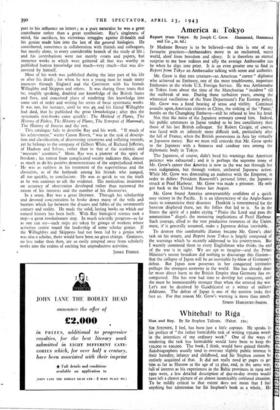America at Tokyo
Report from Tokyo. By Joseph C. Grew. ;Hammond, Hammond and Co. 28. 6d.)
IF Madame Bovary is to be believed and this is one of my
favourite practices—Ambassadors move in an enchanted, secret world, aloof from boredom and idiocy. It is therefore an eternal surprise to me how tedious and silly the average Ambassador can be when he slips into print. It is an even greater one to find in Report from Tokyo an Ambassador talking with sense and authority. Mr. Grew is that rare creature—an American " career " diplomat who achieved an Embassy, one of the most troublesome, important Embassies in the whole U.S. Foreign Service. He was Ambassador in Tokyo from about the time of the Manchurian " incident " till the outbreak of war. During those turbulent years, among the whimsical vacillations of the State Department's Far Eastern policy, Mr. Grew was a fixed bearing of sense and virility. Continual assaults upon,American citizens in China, the sinking of the Panay,' bombs on the Chungking Embassy—still he refused to lose his head. Not that the noise of the Japanese armoury cowed him. Indeed, his public utterances in Japan tended to be less conciliatory than those of his last British colleague. Sir Robert Craigie, of course, was faced with an Infinitely more difficult task, particularly after the fall of France, when the British possessions in Asia lay virtually at Japanese mercy. But we must still concede that Mr. Grew spoke to the Japanese with a firmness and candour rare among the diplomatic body in Tokyo. The Japanese, of course, didn't heed his warnings that American patience was exhausted ; and it is perhaps the supreme irony of Mr. Grew's career that America is now in the war not through her own indignation, but through violent, unilateral Japanese action. While Mr. Grew was demanding an audience with the Emperor; in order to deliver President Roosevelt's personal letter, the Japanese struck at Pearl Harbour. Mr. Grew was made a prisoner. He only got back to the United States last August.
Mr. Grew found America unwarrantably confident of a quick, easy victory in the Pacific. It is an idiosyncrasy of the Anglo-Saxon races to romanticise their disasters Dunkirk is remembered for the heroism displayed there, not the follies that led to it. So in the States the spirit of .a padre crying "Praise the Lord and pass the ammunition " dispeli the menacing implications of Pearl Harbour. Such courage, allied to the vast productive resources of the Union, must, if is generally assumed, make a Japanese defeat inevitable..
To destroy this comfortable illusion became Mr. Grew's chief task on his return, and Report from Tokyo is largely composed of the warnings which he recently addressed to his countrymen. But I warmly commend them to every Englishman who thinks the end of the war is in sight. We are apt .to imagine—and the Prime Minister's recent broadcast did nothing to discourage this illusion— that the collapse of Japan will be an inevitable by-blow of Germany's defeat. But Japan now possesses in her conquered territories perhaps the strongest economy in the world. She has already done far more direct harm to the British Empire than Germany has en- compassed. She has now had time to develop her conquests, and she must be immeasurably stronger than when she entered the war. Let's not be deceived by Guadalcanal or a winter of military doldrums. The defeat of Japan is one of the nastiest tasks that face us. For that reason Mr. Grew's warning is more than timely.
SIMON HARCOURT-SMITH.


























 Previous page
Previous page